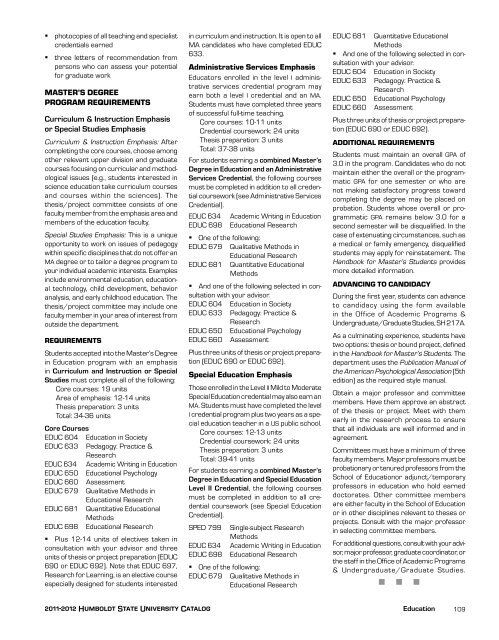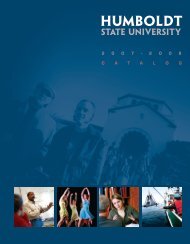2011-12 Academic Year - Bad Request - Humboldt State University
2011-12 Academic Year - Bad Request - Humboldt State University
2011-12 Academic Year - Bad Request - Humboldt State University
Create successful ePaper yourself
Turn your PDF publications into a flip-book with our unique Google optimized e-Paper software.
photocopies of all teaching and specialist<br />
credentials earned<br />
three letters of recommendation from<br />
persons who can assess your potential<br />
for graduate work<br />
MASTER’S DEGREE<br />
PROGRAM REQUIREMENTS<br />
Curriculum & Instruction Emphasis<br />
or Special Studies Emphasis<br />
Curriculum & Instruction Emphasis: After<br />
completing the core courses, choose among<br />
other relevant upper division and graduate<br />
courses focusing on curricular and methodological<br />
issues (e.g., students interested in<br />
science education take curriculum courses<br />
and cours es within the sciences). The<br />
thesis/project committee consists of one<br />
faculty member from the emphasis area and<br />
members of the ed ucation faculty.<br />
Special Studies Emphasis: This is a unique<br />
opportunity to work on issues of pedagogy<br />
within speci fic disci plines that do not offer an<br />
MA degree or to tailor a degree program to<br />
your individual academic interests. Examples<br />
include environ mental education, educational<br />
tech nology, child development, behavior<br />
analysis, and early childhood education. The<br />
thesis/project committee may include one<br />
faculty member in your area of interest from<br />
outside the department.<br />
REQUIREMENTS<br />
Students accepted into the Master’s Degree<br />
in Education program with an emphasis<br />
in Curriculum and Instruction or Special<br />
Studies must complete all of the following:<br />
Core courses: 19 units<br />
Area of emphasis: <strong>12</strong>-14 units<br />
Thesis preparation: 3 units<br />
Total: 34-36 units<br />
Core Courses<br />
EDUC 604 Education in Society<br />
EDUC 633 Pedagogy: Practice &<br />
Research<br />
EDUC 634 <strong>Academic</strong> Writing in Education<br />
EDUC 650 Educational Psychology<br />
EDUC 660 Assessment<br />
EDUC 679 Qualitative Methods in<br />
Educational Research<br />
EDUC 681 Quantitative Educational<br />
Methods<br />
EDUC 698 Educational Research<br />
Plus <strong>12</strong>-14 units of electives taken in<br />
consultation with your advisor and three<br />
units of thesis or project preparation (EDUC<br />
690 or EDUC 692). Note that EDUC 697,<br />
Research for Learning, is an elective course<br />
especially designed for students interested<br />
in curriculum and instruction. It is open to all<br />
MA candidates who have completed EDUC<br />
633.<br />
Administrative Services Emphasis<br />
Educators enrolled in the level I administrative<br />
services credential program may<br />
earn both a level I creden tial and an MA.<br />
Students must have completed three years<br />
of successful full-time teaching.<br />
Core courses: 10-11 units<br />
Credential coursework: 24 units<br />
Thesis preparation: 3 units<br />
Total: 37-38 units<br />
For students earning a combined Master’s<br />
Degree in Education and an Administrative<br />
Services Credential, the following courses<br />
must be completed in addition to all credential<br />
coursework (see Administrative Services<br />
Credential).<br />
EDUC 634 <strong>Academic</strong> Writing in Education<br />
EDUC 698 Educational Research<br />
One of the following:<br />
EDUC 679 Qualitative Methods in<br />
Educational Research<br />
EDUC 681 Quantitative Educational<br />
Methods<br />
And one of the following selected in consultation<br />
with your advisor.<br />
EDUC 604 Education in Society<br />
EDUC 633 Pedagogy: Practice &<br />
Research<br />
EDUC 650 Educational Psychology<br />
EDUC 660 Assessment<br />
Plus three units of thesis or project preparation<br />
(EDUC 690 or EDUC 692).<br />
Special Education Emphasis<br />
Those enrolled in the Level II Mild to Mod erate<br />
Special Education credential may also earn an<br />
MA. Students must have completed the level<br />
I credential program plus two years as a special<br />
education teacher in a US public school.<br />
Core courses: <strong>12</strong>-13 units<br />
Credential coursework: 24 units<br />
Thesis preparation: 3 units<br />
Total: 39-41 units<br />
For students earning a combined Master’s<br />
Degree in Education and Special Education<br />
Level II Credential, the following courses<br />
must be completed in addition to all credential<br />
coursework (see Special Education<br />
Credential).<br />
SPED 799 Single-subject Research<br />
Methods<br />
EDUC 634 <strong>Academic</strong> Writing in Education<br />
EDUC 698 Educational Research<br />
One of the following:<br />
EDUC 679 Qualitative Methods in<br />
Educational Research<br />
EDUC 681 Quantitative Educational<br />
Methods<br />
And one of the following selected in consultation<br />
with your advisor.<br />
EDUC 604 Education in Society<br />
EDUC 633 Pedagogy: Practice &<br />
Research<br />
EDUC 650 Educational Psychology<br />
EDUC 660 Assessment<br />
Plus three units of thesis or project preparation<br />
(EDUC 690 or EDUC 692).<br />
ADDITIONAL REQUIREMENTS<br />
Students must maintain an overall GPA of<br />
3.0 in the program. Candidates who do not<br />
maintain either the overall or the programmatic<br />
GPA for one semester or who are<br />
not making satisfactory progress toward<br />
completing the degree may be placed on<br />
probation. Students whose overall or programmatic<br />
GPA remains below 3.0 for a<br />
second semester will be disqualified. In the<br />
case of extenuating circumstances, such as<br />
a medical or family emergency, disqualified<br />
students may apply for reinstatement. The<br />
Handbook for Master’s Students provides<br />
more detailed informa tion.<br />
ADVANCING TO CANDIDACY<br />
During the first year, students can advance<br />
to candidacy using the form available<br />
in the Office of <strong>Academic</strong> Programs &<br />
Undergraduate/Graduate Studies, SH 217A.<br />
As a culminating experience, students have<br />
two options: thesis or bound proj ect, defined<br />
in the Handbook for Master’s Students. The<br />
department uses the Publication Man ual of<br />
the American Psychological Association (5th<br />
edition) as the required style manual.<br />
Obtain a major professor and committee<br />
members. Have them approve an abstract<br />
of the thesis or project. Meet with them<br />
early in the research process to ensure<br />
that all individuals are well in formed and in<br />
agreement.<br />
Committees must have a minimum of three<br />
faculty members. Major professors must be<br />
probationary or tenured professors from the<br />
School of Educationor adjunct/temporary<br />
professors in education who hold earned<br />
doctorates. Other committee members<br />
are either faculty in the School of Education<br />
or in other disciplines relevant to theses or<br />
proj ects. Consult with the major professor<br />
in selecting committee members.<br />
For additional questions, consult with your advisor,<br />
major professor, graduate coordinator, or<br />
the staff in the Office of <strong>Academic</strong> Programs<br />
& Undergraduate/Graduate Studies.<br />
n n n<br />
<strong>2011</strong>-20<strong>12</strong> <strong>Humboldt</strong> <strong>State</strong> <strong>University</strong> Catalog Education<br />
109

















